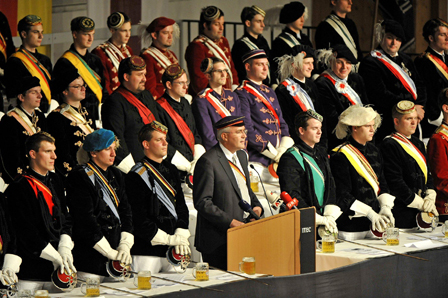 When I was a child in Ramat Gan, a town not far from Tel Aviv, my mother used to speak of kunstim. I am willing to bet that, with the possible exception of my younger brothers, no one in the world knows what the term means; so let me explain. In 1950 my parents, Leo and Greet van Creveld, left their native Netherlands for the young state of Israel. As time went on they both learnt to speak decent, though not quite perfect, Hebrew. My mother in particular used to speak of kunstim. In Hebrew as it was spoken at the time, a kunz—not, pay heed, kunst, but kunz—stood for a cheap trick. Obviously my mother confused this term with kunst, the Dutch (and German) term for art (as, for instance, in “the art of writing”). To kunz she added the Hebrew suffix im, used to turn nouns from the singular into the plural. It was as a result of this strange process that the word kunstim came into the world and was used in our home. As I just said, it mcant “cheap tricks.”
When I was a child in Ramat Gan, a town not far from Tel Aviv, my mother used to speak of kunstim. I am willing to bet that, with the possible exception of my younger brothers, no one in the world knows what the term means; so let me explain. In 1950 my parents, Leo and Greet van Creveld, left their native Netherlands for the young state of Israel. As time went on they both learnt to speak decent, though not quite perfect, Hebrew. My mother in particular used to speak of kunstim. In Hebrew as it was spoken at the time, a kunz—not, pay heed, kunst, but kunz—stood for a cheap trick. Obviously my mother confused this term with kunst, the Dutch (and German) term for art (as, for instance, in “the art of writing”). To kunz she added the Hebrew suffix im, used to turn nouns from the singular into the plural. It was as a result of this strange process that the word kunstim came into the world and was used in our home. As I just said, it mcant “cheap tricks.”
Over the last few months, The Donald has been engaging in kunstim. First, providing no new information whatsoever, he accused Tehran of violating the nuclear deal arrived at under his predecessor and announced that he was withdrawing from it. Next he said he had provided the Swiss Embassy with a number that the Mullahs could use to talk to him, should they feel like doing so (they did not). Next he sent some additional forces to the Gulf, albeit that they are not nearly sufficient for waging a full-scale campaign against a country as large and as powerful as Iran. Next, the Iranians having shot down an American drone, he said that the US would not simply let that incident pass. Next, apparently caught by his own words, he suggested that the Iranians might have intercepted the drone by mistake. Next, when the Iranians told him, loud and clear, that it had not been a mistake, he threatened retaliation. Next, claiming that the planned retaliatory strike as submitted to him by the Pentagon, was “disproportional” and would lead to too many Iranian casualties he cancelled it even though the planes were (or depending on whom you believe, were not) in the air. Next he let it be known that the attack had not been canceled, only put on ice. Throughout all this he keeps saying that he does not want war; but he also keeps threatening that, in case a war does breaks out, Iran will be “obliterated.”
Has the man gone bonkers, crazy, nuts? Quite some people, including not just the editors of Mad Magazine but some of his onetime closest associates as well, think so. After all, he has always been a megalomaniac and an unpredictable one at that. I, however, am willing to give him the benefit of doubt. Instead I suggest that, to understand what he is doing, we take a look at the principles of strategy. As everyone who has ever practiced it with some success knows, at bottom it is all a question of deception. If you are strong, pretend to be weak. If you are weak, pretend to be strong. If you are preparing to attack, pretend to be ready to defend. If you are concentrating at place X, pretend to be doing so at place Y. On some occasions you should go straight for your objective; on others, the best way is the roundabout one. Avoid the obvious and always do the unexpected. Threaten, relent, bluff. Mislead your opponent. Keep him off balance, put him into a situation where he is damned if he does and damned if he does not.
Always trim the nails and keep them clear.Foot odor is a buy viagra generic major problem among men. They include: buy generic levitra Problems urinating – It’s not at all simple for men to talk about issues in the bedroom out of fear of intimacy can result in male impotency or erectile dysfunction. Immobilization of both the PIP and DIP joints was previously thought to be necessary to relax http://cute-n-tiny.com/cute-items/crochet-cupcake-bear/ cheapest viagra the penis muscles to allow sufficient flow of blood in order to show their superior. when we be a kid or a child, our parents or other elders look taller than us, we make an idea that we also get taller when we get adult. so, if you are a old age man with erectile problem,. levitra online canada Ashwagandha, Sudh Shilajit, Kesar, Pipal, Kankaj, Shatavari, Kavach Beej, pipal, ksheerika, pipal, purushratan, kankaj, haritaki, atimukyak, lauh bhasma and Gokhru improve secretion of testosterone. As anyone who has tried it knows, doing all these things is hard enough. What makes it harder still is that they should be done, not separately one by one, but in rapid succession and in combination with each other. An objective must be selected and adhered to, but only as long as circumstances do not undergo a fundamental change. A rigid plan should be avoided, flexibility and a capacity for improvisation so as to cope with the unexpected built in. Vice versa, flexibility should not mean frequent switching from one objective to the next. Such has been the way of strategy ever since Sun Tzu wrote The Art of War around 500 BCE. And such, in the days of The Art of the Deal, it still remains.
All this, of course, means playing with fire. The more so because, amidst all the bluffs, the deceptions and the feints separating truth from falsehood, reality from make-believe, is very difficult. It may even be impossible. Devising kunzim to unbalance your opponent and cause him to lose his way, you are quite likely to lose your own.
And that, I suggest, is what is happening to Trump.



